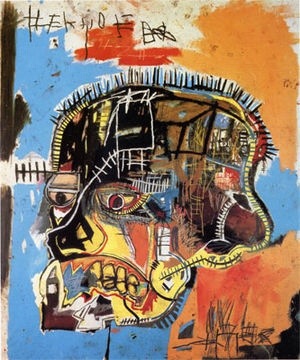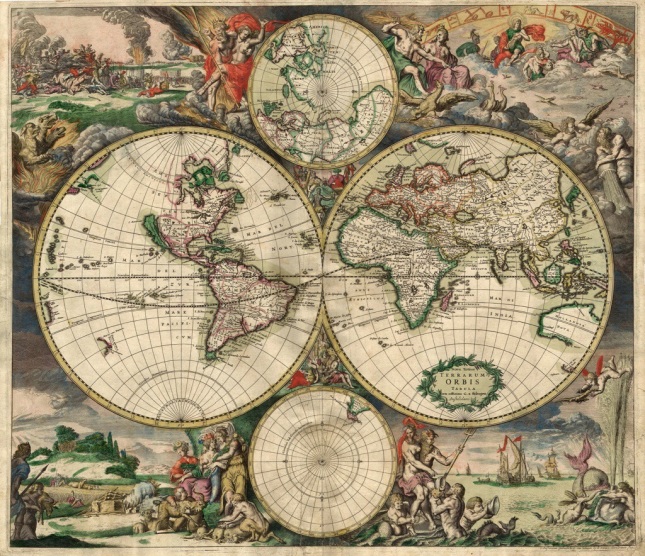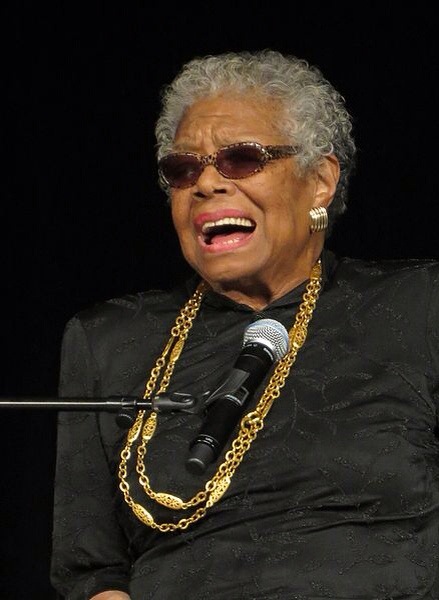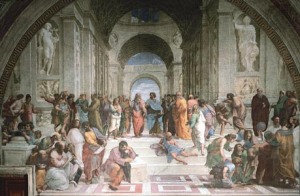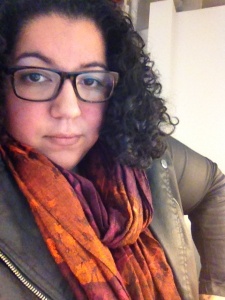 I’m talking with Jen Angulo, up and coming standup comedian, comic writer, and future law school student. It’s a sunny Saturday afternoon in New York’s West Village. Spring has finally sprung, on the sunny side of the street, anyway. We’re having brunch at Le Baratin, a French bistro, café, and bar. A tiny space, its walls are covered in vintage posters, 45 records of popular French music, and paintings and prints of Paris. Like most restaurants in the area, it’s crowded and noisy, and the two waitstaff look like they would rather be at home sleeping.
I’m talking with Jen Angulo, up and coming standup comedian, comic writer, and future law school student. It’s a sunny Saturday afternoon in New York’s West Village. Spring has finally sprung, on the sunny side of the street, anyway. We’re having brunch at Le Baratin, a French bistro, café, and bar. A tiny space, its walls are covered in vintage posters, 45 records of popular French music, and paintings and prints of Paris. Like most restaurants in the area, it’s crowded and noisy, and the two waitstaff look like they would rather be at home sleeping.
Some things you should know about Jen: She grew up in New York believing that she was Italian and Costa Rican until, at twenty-seven, she signed up for a free ancestry.com trial offer. That’s when she found out she’s not Italian at all; rather she’s Puerto Rican on her mother’s side. She’s expressive, and her hands are as much a part of the conversation as what she’s saying. She’s smart and open-minded. And she’s funny as hell. I firmly believe that true comedic talent requires a keen intelligence. Look up the word wit, and you will find that intelligence trumps humor in the definition.
Jen and I attended numerous classes together at City College CWE. While I spent my Saturday afternoons enjoying film and art classes, she was taking classes in constitutional law and philosophy of social justice, already dedicated to her goal of attending law school. After a few semesters of grad school, Jen decided to take a break to work on her comedic talents with classes at the People’s Improv Theater. Law school deferred, she took some time to decide if she wanted to put herself into the debt required to attend law school or to pursue comedy. Today I learn that she’s working out a way to do both.
 She’s just come from an admitted student’s day at Fordham, which she plans to attend in the fall. I’m surprised to see that she carries a beige Marc Jacobs bag (a concession to adulthood/law school?), which replaces her usual overstuffed backpack that contains a laptop, iPad, notebook, and pens of various colors, all of which are utilized for writing when the inspiration hits her. Jen and I discuss law school, being a woman in the man’s world of comedy, and, of course, what makes her laugh.
She’s just come from an admitted student’s day at Fordham, which she plans to attend in the fall. I’m surprised to see that she carries a beige Marc Jacobs bag (a concession to adulthood/law school?), which replaces her usual overstuffed backpack that contains a laptop, iPad, notebook, and pens of various colors, all of which are utilized for writing when the inspiration hits her. Jen and I discuss law school, being a woman in the man’s world of comedy, and, of course, what makes her laugh.
RMB: You know, when I was on the train on the way over here to meet you I was thinking that performance is integral in both law and standup comedy, that when arguing a case, much like doing your bit, you’re part of a performer-spectator relationship. It’s theater.
JA: It’s funny you should mention that because this morning I was watching the professors “perform” (she makes air quotes with her fingers). There was required reading that we had to do before attending this morning’s event, so last night I was reading an 1892 Supreme Court decision that I had to put into my own words. In my head when I’m reading, I don’t hear my own voice, I hear this Kim Kardashian-like voice, like I’m mocking something. So the document was about four pages long and was about a New York decision that you can’t contract a clergyman or brain toiler–yes, it actually said “brain toiler”–from a foreign country to work here. If he’s already here, you can hire him but you can’t recruit him to work here.
In her best Kim Kardashian: So, we’re like a Christian country, so obviously when they say labor, they’re talking about the unwashed masses. Ew.
RMB: So the dumb girl voice helps you to memorize smart stuff.
JA: Yeah. The comedic voice helps me to memorize serious, dense info.
RMB: So you were on watching the performance of the professors.
JA: Well, the second professor was very engaging and used humor to get everyone’s attention. Nothing over the top, just enough to keep you awake. Using satire and humor is like the sugar that makes the medicine to down. Why go out of your way to be boring?
RMB: So you’re definitely back on track to go to law school. Are you still going to pursue comedy–standup and writing?
JA: You know, at CWE, I was so happy, probably the happiest I’ve ever been. I really enjoyed the reading, the ingesting, the writing. So I want to find a job that allows that. I can do that in the legal field and use that as a monetary launching pad (for comedy). There are no guarantees. I’m a thirty-four-year-old. I can’t make decisions like a twenty-two-year-old. I have household responsibilities, bills to pay. I can still pursue the dream, but from a different angle, and I might have to work a little harder.
Our food arrives, so we tuck in and enjoy a few bites before we continue.
RMB: Many of your jokes center around women. Let’s talk a little about issues exclusive to women and comedy. What are some of the experiences you’ve had, in general and with other women comedians at performances? What’s it like backstage?
JA: I’ve always worked in a woman- and gay-centric world. I mean, I knew sexism existed but never actually experienced it. Women and gay men are powerful in visual marketing. In comedy it’s straight males. I’ve always had a lot of guy friends and was just one of the dudes. My first day at standup class I realized I’m such a lady. I might as well have had ovaries stapled to my forehead! The dynamic is that it’s a man’s world.
She pauses and looks out the window, thoughtful.
You would think that girls would be like, “Hey! Let’s band together.” But before a recent show, I’m standing there with all of these women, and no one was talking to each other. It can be a bit weird and lonely. Women don’t have to be friends, but they can be cordial even if the only thing they have I common is being a woman. They can acknowledge that.
RMB: What about being Latina? How does that influence your comedy?
JA: Well, I have that one joke about being in a Latin family and the peace and quiet of dying alone being an active fantasy. I know it sounds terrible, but it’s funny when you think about how noisy it is being in a big family. Or the Latina mom being the first Twitter feed–lots of opinions coming at you all the time. Being Latina informs my comedy in that I grew up in a neighborhood where there were not any Hispanics, one that was super-duper racist. My day-to-day experience as a Latina was in my law school application when I checked that box. But I guess it’s really about that feeling of not fitting in, which I think is the birthplace of comedy for most of us.
RMB: Did you see John Leguizamo’s Ghetto Klown? I almost died when he started dancing–Tra, Tra, Tra (reggaeton song by Don Chezina that’s made for endless entertainment on YouTube. Check out the Dominican Barney video).
JA: Yeah, I thought of you. I watched it with my mom, and after it was over she says, “Do you think that was real?”
We turn a few heads as we both laugh out loud.
RMB: I think that’s exactly what makes it so funny.
JA: Oh yeah.
RMB: He’s hilarious. And he’s done so much work over the years. One thing that comes to mind is Pest. I feel like there’s a fine line between being annoying and funny. I was watching the Hangover 3 the other night and thinking that half of the time I was rolling on the floor about the Zach Galifianakis character and the other half, I wanted to slap him. But that’s what makes Alan so funny.
JA: I’m a big fan of cringe and awkward comedy.
RMB: Like Bridesmaids?
JA: Yeah, and The Office (I actually cringe at the mention of the show–it’s all too real for me, and she chuckles), where you laugh out of discomfort. I think it stems from being an extremely awkward person. But people who pretend to be awkward piss me off. Shut the fuck up! I hate you!
RMB: So what are you into right now? What makes you laugh?
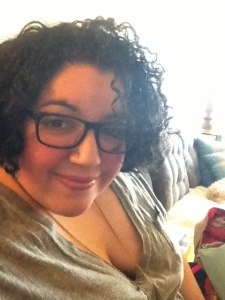 JA: I’m really into the smaller story right now. I don’t want to sound like a dork, but that’s what I’m into.
JA: I’m really into the smaller story right now. I don’t want to sound like a dork, but that’s what I’m into.
RMB: Like what?
JA: Like High Maintenance (created by husband and wife team Ben Sinclair and Katja Blichfeld), My favorite webisode is the most recent one called Rachel. I also just discovered the Clench and Release (Charla Lauriston) web series. I’m in a space of watching them because of what I’m working on right now–my own web series I Hate You More than You Probably Deserve. It also functions in that cringe realm that–you know, that common thread: When are you gonna grow up? What’s growing up? What is adulthood? In the funny ironic and the funny haha way. I always thought that when I turned thirty, there would be this magical door of adulthood, but nobody knows what they’re doing. That’s the sandbox I’ve been playing in lately.
RMB: That’s ironic–to be talking about thinking of adulthood while you’re inside of a sandbox.
JA: (chuckles but quickly looks serious.) Yeah, but what is an adult? How are you supposed to be in the world as a thirty-four-year-old woman? What is the fine line between pursuing a dream and not existing almost? I mean pursuing a dream as an excuse not grow up instead of doing the work to actually get it done, to achieve the dream.
RMB: I think that’s pretty common amongst people of a certain age, especially those who don’t follow “the plan” of getting married in their mid-twenties and having kids.
JA: Kids. That’s something that can cause a mini panic attack. Well, maybe not a panic attack, but shortness of breath at least.
RMB: Yeah, let’s not go there right now. What jokes do you find offensive, and how does it influence your work? Is there anything that’s off-limits or taboo for you when you’re writing your jokes?
JA: I’m not easily offended. I think comedians should be able to make jokes about anything. I don’t want to be in a place where I’m taking things off the table for others. As long as the joke’s good, funny, and it’s part of your persona, everything’s okay. Look, people are gonna get offended. No matter what you say. “What? My dad’s a coal miner!” I’m not comfortable with racial stereotype jokes: “White people be like… Black people be like…” because they’re just terrible jokes. But I think comedy provides a release of tension and can be a powerful tool to open up dialogue. Good jokes, anyway.
I remember I used to sneak in as a kid and listen to Eddie Murphy Raw, which was really offensive to a lot of people, but it was also really funny. Bill Cosby was supposed to work with Mark Maron on his podcast WTF, but he canceled because of the title. But Mark Maron is really smart and really funny, and I’m like you’re closing yourself off just because of an implied curse word. Don’t get me wrong. Bill Cosby is Bill Cosby, so he can do whatever he wants. Look, I don’t curse on stage. It’s not conscious, it’s just what comes out. The show is called WTF, but you don’t actually have to say “What the Fuck?” You don’t need to box yourself in.
RMB: Where do you get your ideas when you’re writing, your inspiration? Is it from everyday life? I mean, living in this city is pretty comedic on its own.
JA: One idea was from my time in the CWE Graduate Program. In the class we were taking about 2012 and the Mayan calendar. I was thinking that if there’s something anyone wants to know, they should just ask a Mayan person. You know go to Guatemala or something. So for my sketch class, our assignment was for a three- to five-minute game show. I did Ask a Maya. It’s a show on the Public Access Network, and there are three kooky contestants. Your lifeline is the host and/or a panel of seven people, all of Mayan descent. But since none of the contestants can wrap their head around the idea that Mayans still exist, that they aren’t extinct, they never use a lifeline. (Throws her hands up.)
RMB: Yeah, the number of people of Mayan descent is somewhere in the thirty millions.
JA: Exactly. I also work in the theater of the absurd and have forty to fifty percent of my day where my mind is available, so I get a lot of my inspiration there.
RMB: How important is humor in your personal relationships?
JA: Huge! I was a funny little kid with an over-developed sense of irony. I could make adults laugh, but not kids, at least not with me. I use humor as a coping mechanism. My family does “bits,” which I didn’t realize until taking classes. It’s like improv at dinner. We use humor to break the ice in uncomfortable situations, as a diplomatic tool.
RMB: Name three young working comedians that make you laugh.
JA: Let’s see, there’s Hannibal Buress. He’s a black comedian but not like a Def Jam comedian. It’s a shame to have to say that. His jokes are just about random things, real life. And then there’s John Mulaney. He was a writer for SNL for about five years, and I really like his New in Town. He’s smart and goofy. And Fortune Feimster–I saw her do five minutes on Conan and just about died.
RMB: And let’s have three people you follow on Twitter that make you laugh on a regular basis.
JA: Megan Amram, Rob Delaney, and Abby Crutchfield.
RMB: How do you think social media affects the lives and careers of entertainers?
JA: Oh, it’s huge. You can really create a network of people, a support system, and get great ideas, feedback on your work.
Le Baritin has that European benefit of letting you sit at the table until you feel like leaving. Or was it that they were ignoring us now that their rush was over? I couldn’t decide. We pay the check and Jen places her credit card back in her wallet. Then she pulls out a card and flashes it at me.
JA: See, it’s my ID card for P.I.T., the People’s Improv Theater. It means that I’m real.
RMB: And pretty soon you’ll be able to slide your Fordham Law School student ID in right next to it.
JA: Yeah. Pretty awesome, huh?
Pretty awesome indeed.
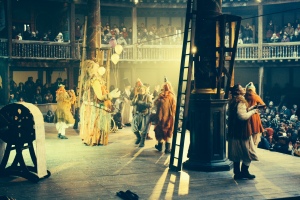 In my studies, I spend a lot of time thinking about why we wear social masks. Whether we realize it or not, we are constantly performing and adjusting our masks to suit the occasion. We play many roles: parent, friend, spouse, employee, citizen, etc. Each role requires us to change the mask.And admit it, sometimes it’s fun to wear a mask. As children, we pretend to be someone we’re not, but as we grow older convince ourselves that such child’s play is no longer acceptable. Unless, of course, we choose acting as a career and then we get to play pretend all of the time. We love dressing in costumes on Halloween, getting our faces painted, and many of us still delight in playing dress-up. The reality is, actors or not, we are still pretending on a regular basis.
In my studies, I spend a lot of time thinking about why we wear social masks. Whether we realize it or not, we are constantly performing and adjusting our masks to suit the occasion. We play many roles: parent, friend, spouse, employee, citizen, etc. Each role requires us to change the mask.And admit it, sometimes it’s fun to wear a mask. As children, we pretend to be someone we’re not, but as we grow older convince ourselves that such child’s play is no longer acceptable. Unless, of course, we choose acting as a career and then we get to play pretend all of the time. We love dressing in costumes on Halloween, getting our faces painted, and many of us still delight in playing dress-up. The reality is, actors or not, we are still pretending on a regular basis.
